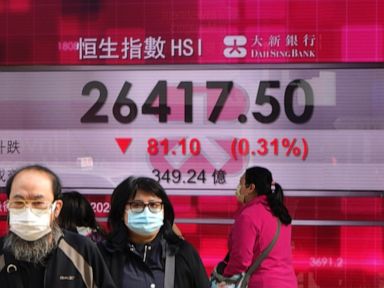
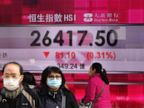

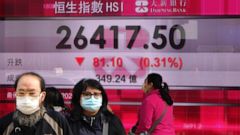
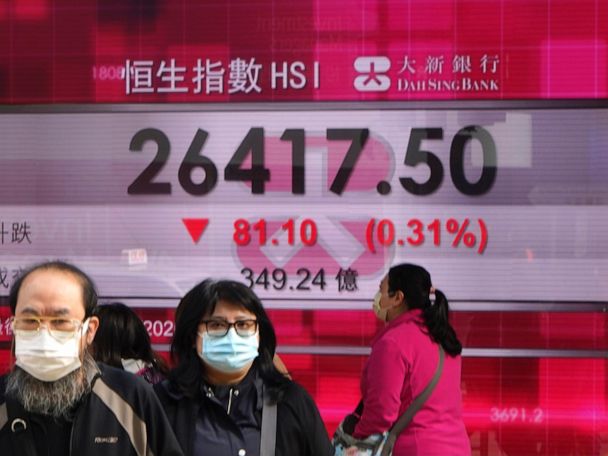
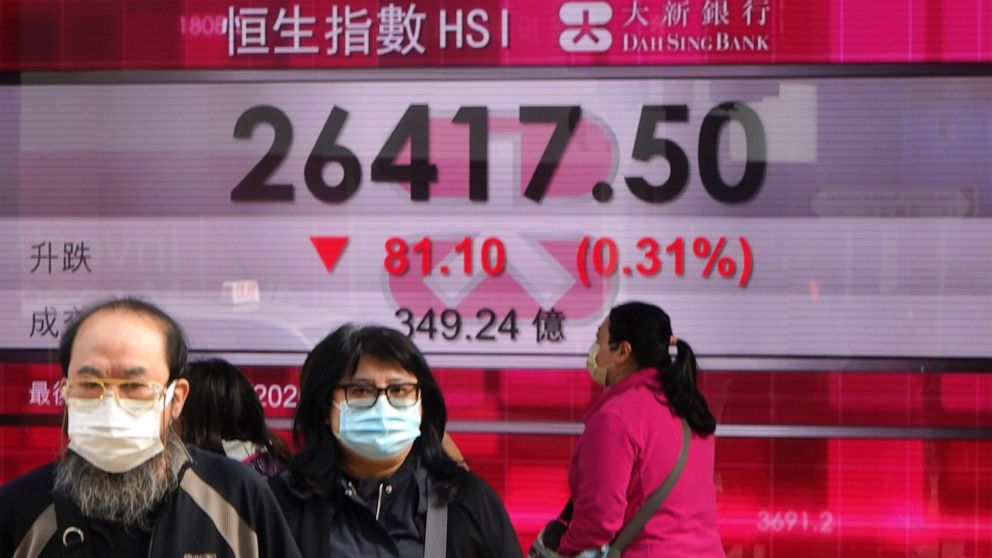

Stocks are falling Monday as a new, potentially more infectious strain of the coronavirus has countries around the world restricting travel from the United Kingdom, raising worries that the economy is about to take even worse punishment
The S&P 500 was 0.7% lower in afternoon trading, on pace for a second straight drop after setting its record on Thursday. But the index pared its loss as the day progressed, recovering from an earlier 2% drop.
The Dow Jones Industrial Average was down 8 points, or less than 0.1%, at 30,170, as of 12:51 p.m. Eastern time, after erasing most of an earlier 423 point loss. The Nasdaq composite was 0.5% lower.
It’s a busy day of trading, with plenty of forces pushing and pulling the market. Thin trading ahead of a holiday-shortened week may also be exacerbating moves, analysts said. Crude oil prices were also dropping on worries about disappearing demand, and Treasury yields slipped.
One big factor for the market is Congress, which finally appears set to act on a $900 billion relief effort for the economy. House and Senate leaders are planning to vote Monday on the deal, which would include $600 in cash payments sent to most Americans, extra benefits for laid-off workers and other financial support.
Economists and investors have been clamoring for such aid for months, and a recent upswing in momentum for talks had stock prices rising in anticipation of a deal. Analysts said some traders may be selling now to lock in profits, with the compromise all but assured and prices close to the highest they’ve ever been. Even after Monday’s drop, the S&P 500 is back only to where it was earlier this month.
Across the Atlantic, negotiators blew past a Sunday deadline set for talks on trade terms for the United Kingdom’s exit from the European Union. Investors have been fixed on the progress of those talks because a Brexit with no deal could cause massive disruptions for businesses on New Year’s Day.
Monday is also the first day of trading for Tesla since joining the S&P 500 index. The electric-vehicle maker surged so much this year, nearly 731% as of Friday evening, that some critics say its price doesn’t make sense. But its inclusion in the benchmark index triggered $90.3 billion in trades, as the company instantly became the sixth-biggest in the S&P 500. Tesla slumped 4.9% Monday.
The market’s focus, though, was centered nearly 3,500 miles to the east of Wall Street, where U.K. Prime Minister Boris Johnson said Saturday that he was placing London and the southeast of England in a new level of restrictions after scientific advisers warned they detected a new variant of the coronavirus. There is no evidence that the new strain’s mutations make it more deadly, but it seems to infect more easily than others.
Two COVID-19 vaccines have already been approved for the United States, and regulators around the world have also either approved or are considering usage of the vaccines. Hope that widespread vaccinations will nurse the economy back to some semblance of normal has been a big reason for surging prices across markets worldwide.
But for now, vaccinations are only for health care workers and other high-risk populations. It will be a while before a more widespread rollout can get life around the world closer to normal, and surging numbers of coronavirus counts and deaths in the meanwhile are setting the global economy up for a bleak few months.
The worries hit stock markets hardest in Europe, where France banned U.K. trucks from entering for a period of 48 hours. Other countries around the world also halted flights from the United Kingdom.
France’s CAC 40 fell 2.4%, and Germany’s DAX lost 2.8%. The FTSE 100 in London dropped 1.7%.
All the new restrictions on movement also sent travel-related stocks on Wall Street to sharp losses. Cruise operator Carnival dropped 3.9%, Norwegian Cruise Line fell 2.9% and American Airlines lost 3.5%.
Stocks of energy producers were also weak on worries that heightened travel restrictions could mean even fewer airplane seats filled and fewer miles driven by automobiles.
Amid the market’s few gainers was Nike, which rose 5% after reporting stronger revenue and profit for its latest quarter than analysts expected.
Financial stocks were another rare source of resilience, after the Federal Reserve said Friday that the 33 largest banks look healthy enough to survive a sharp downturn. The Fed also permitted buybacks of company stock, with some limits.
Goldman Sachs rose 7% after it said it expects to begin buying back its stock again next quarter. Goldman Sachs and Nike are two of the 30 stocks in the Dow, and their big moves higher left it faring much better than measures of the broader stock market.
In Asian stock markets, Tokyo’s Nikkei 225 lost 0.2% after Japan’s Cabinet approved a record annual budget of 106.6 trillion yen ($1.03 trillion) for the coming fiscal year, which begins April 1.
Hong Kong’s Hang Seng dropped 0.7%, South Korea’s Kospi recovered from early losses to gain 0.2% and stocks in Shanghai rose 0.8%.
The yield on the 10-year Treasury slipped to 0.92% from 0.93% late Friday.
———
AP Business Writer Elaine Kurtenbach contributed.

